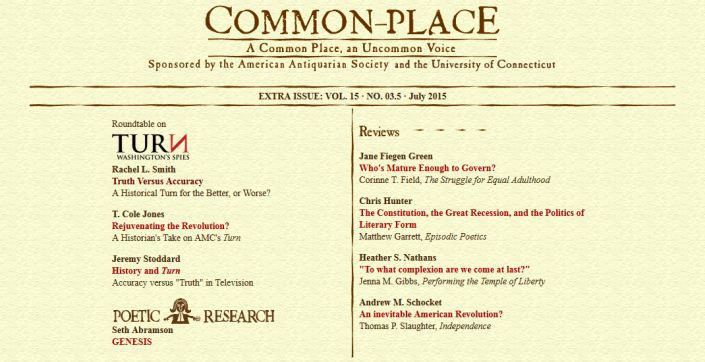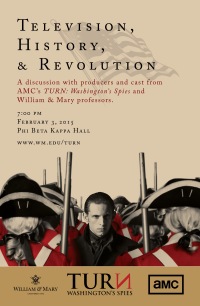New Scholarly Roundtable on Historical Accuracy vs. “Truth” in TURN
Academia finally joins the conversation about TURN! The newest issue of Common-place, an online scholarly journal of Early American life and culture, just launched yesterday — and it features a Roundtable discussion about historical accuracy in TV and film, using TURN: Washington’s Spies as a case study. Don’t let the “scholarly journal” part scare you off — the two main articles in this Roundtable are spirited and highly-readable commentary pieces that are must-reads for any serious fan — or critic — of TURN.

Back in February of this year, we mentioned a most unlikely meeting of the minds at the College of William & Mary, where TURN producers, writers, and cast members gathered onstage alongside William & Mary professors to discuss the role and importance of historical accuracy in film. Happily, footage of the entire 90 minute event was released on Youtube in May, with shorter highlights posted in a William & Mary press release (in case you don’t have an hour and a half to spare).
This new issue of Common-place continues that incredibly important conversation, featuring some names that might be familiar to readers of this blog. To kick things off, I wrote the brief introduction to the Roundtable, framing the debate’s central questions:
- Do the virtues of inaccurate historical films outweigh their vices?
- How much weight should accuracy have in our evaluation of historical film?
- Most importantly, are there historical narrative truths that supersede factual accuracy?
To devoted students of history, that last question might sound silly, if not completely ridiculous — after all, if facts don’t matter, then what does? But it’s a question that more and more people these days — including the writers and producers of TURN — are answering with a resounding “YES.”

Jeremy Stoddard, a professor of education and film studies, gives TV and film writers the benefit of the doubt, arguing that fictional historical narratives DO have value (that is, beyond the monetary sort), referencing his own quest to learn more about Robert Rogers after watching the TURN series premiere. Stoddard, who attended the William & Mary event in person, gives readers a thoroughly detailed summary of the arguments given by TURN’s writers, producers, and other staff (e.g. the costumer) for why they deviated from the historical record in the way that they did. Read Jeremy Stoddard’s Roundtable article here.
On the other end of the debate, T. Cole Jones explains why he finds TURN’s blatant disregard for historical fact extremely problematic. Longtime readers of this blog are already familiar with Dr. Jones, who penned an excellent piece analyzing the treatment of prisoners of war in Season 1 of TURN. In his article for Common-place, Jones targets the show’s portrayal of John Graves Simcoe as a murderous sociopath and cartoonish British villain. He doesn’t mince words, arguing that TURN’s “artistic liberties” are so factually untrue they’d “undoubtedly expose the producers to a defamation of character suit were the people portrayed in the series still alive.” According to Jones, a number of TURN’s factual problems can be traced back to the show’s alleged source material: Alexander Rose’s book Washington’s Spies. It’s a solemn reminder that not all history books are created equal. (We’ll be offering our own concurring opinion on this point sometime later in the TURN offseason.) Read Cole Jones’ Roundtable article here.
Like I said, these pieces are must-reads for any serious fan or critic of TURN — or of historical fiction in general. If you have a Disqus account, you can leave comments on the articles themselves, or join the conversation on Twitter.
Finally: It’s incredibly refreshing to see academics engaging this issue in a scholarly forum — and my thanks to the event organizers at William & Mary for providing an excellent icebreaker back in February. Far too many scholars of Early America have asked the same question voiced by certain TURN fans upon finding this blog: So what? Who cares if some TV show is historically accurate or not? Over the past two years, I’ve been stunned — though not entirely surprised — at how many academics have plugged their ears to the debates taking place over historical accuracy in TURN, often dismissing the subject as insufficiently intellectual or otherwise not worth their attention. They couldn’t be more wrong.
Granted, the primary purpose of TV shows is to entertain, not educate. (And make money doing it.) However, as I argue in the introduction I authored for the Roundtable, the question of accuracy in film does matter because, for better or for worse, historical fiction influences popular historical memory. These TV shows and films are affecting how Americans remember their own history. And for that reason, among others, scholars of Early America ought to weigh in on these debates — which, in many cases, are already happening all around them. As we’re seeing with a number of recent events (e.g. the Confederate Flag brouhaha), the intersection of history and memory impacts an awful lot of people. We do the American public a grave disservice if we let the same people who write questionable “history” books — and the shows and films based on them — be the loudest voices in the conversation.
Check out a 60-second video preview of the new Common-place issue below:
(Note, Jan. 2016: Last year, a few months after the TURN Roundtable was published, Common-place unveiled a brand-new look and a more modern, streamlined format. Eventually, the TURN Roundtable articles will be migrated over to the new journal format, along with the rest of Common-place’s back issues – but until then, they can be found at common-place-archives.org. All the links in this post have been updated to reflect this change. Enjoy!)
-RLS


July 22, 2015 at 5:32 pm
Oh brava! I can’t wait to read/watch all this material. Yes, it is so important to pay attention to historical fiction. It’s become such a popular entertainment vehicle, and some of it is truly cringeworthy (“The Tudors” springs to mind!). Thanks for this post!
May 10, 2016 at 7:29 pm
For me, the bottom line is this: DON’T label something historically accurate when its not. DON’T imply historical accuracy when that isn’t what your going to try for. TV shows, don’t claim to be telling what actually happened if you’re not going to. But most of all, please, PLEASE don’t use real people if you’re not interested in actually portraying them as they were. Make up a new name along with the new personality, life events, family history, life choices, etc.! I’ve seen far too many times where a fictional take on a real, historical person ends up defining them from then on. Tsarevich Alexei Petrovich is a prime example. He has been demonized for YEARS and still can’t escape the completely unfounded characterization of a plotting, heartless, spoiled brat of a man that he NEVER was.
You can have a perfectly great historical show about fictional people in a historical time period. And what is wrong with marketing a show as historical fantasy, or alternate history, if you aren’t interested in what actually happened?? TV shows/movies: don’t promise me something that you aren’t interested in giving me.
Also, why are historical fiction books held to such rigorous standards, but movies and TV get this “get out of jail free” card because they’re visual?? Historical fiction books are “just entertainment” too, yet somehow they get lampooned for inaccuracy, while the visual story-telling mediums don’t (by most folk, anyway). I just don’t get it.
May 24, 2016 at 2:51 pm
Agreed. If “Hamilton” has taught us anything, it’s historical understanding depends on who is writing it and, thus, who is controlling the narrative. The odious Simcoe, like the Revolutionary Hamilton friend, Henry Laurens, advocated freeing African slaves. The founder of Toronto, then Upper Canada after the revolution, Simcoe largely participated in the abolition of black slavery in Upper Canada before any other part of the British Empire and well before the U.S. Civil War. Canada did so in the 1790s!